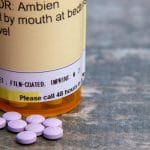- How Long Is Ambien In Your Urine
- How Long Is Ambien In Your Saliva
- How Long Is Ambien In Your Blood
- How Long Is Ambien In Your Hair
- Half-Life
- Treatment Options
Ambien can stay in your system for about 13 hours after the last dose.
Ambien is a commonly prescribed brand name sleeping pill. Its main ingredient, zolpidem, is a sedative-hypnotic that slows activity in the central nervous system. Compared to other prescription medications, Ambien may remain in the body for a relatively short period of time.
Recent Ambien use can be detected by some drug tests. Some forms of drug testing may detect Ambien several days after you have stopped taking it. An Ambien drug test may be performed by your employer or if you are suspected of substance abuse.
Drug Tests & Detection Times For Ambien Use
Standard drug tests may not detect sleep aids such as Ambien. Specific drug testing methods may be needed to detect Ambien use.
Zolpidem is not broken down into metabolites, or detectible components, by the body. The drug is mostly unchanged when it leaves the body through the urine, and drug tests may look for unchanged zolpidem as a sign of recent Ambien use.
Urine Test
Urine tests can detect Ambien for about 1 to 3 days after the last use.
Urine tests are a common form of testing for prescription drug abuse, due to their convenience and relatively non-invasive nature.
Saliva Test
Saliva tests can detect zolpidem for several hours after the last dose of Ambien.
Saliva tests can be more convenient and accurate than urine tests due to the reduced possibility of tampering. However, patients with other objects in their mouth, such as food or beverages, may return an inconclusive test.
Blood Test
Blood tests can detect Ambien for several hours after the last dose.
Blood tests may not be a popular testing method due to the invasive nature of the test and short-term detection window. A blood test may be performed on a patient displaying Ambien withdrawal symptoms in a medical setting.
Hair Test
Hair tests for Ambien use may not be as developed as other forms of testing. Some studies report a detection window of about five weeks in hair, while others report that factors such as preparation techniques and even hair color may affect testing results.
More research may be needed to develop an accurate form of hair testing for Ambien use.
Half-Life Of Ambien
Half-life is the amount of time it takes for a drug to decrease to half of its maximum concentration. Half-life can be used to calculate the elimination time of a drug; in this case, how long Ambien stays in your system.
After about five half-life cycles, most drugs are virtually eliminated from the body.
Both Ambien and Ambien CR have a half-life of around 2.8 hours. On average, both drugs may have an elimination time of about 13 hours.
During this time, you may feel the effects as well as the side effects of Ambien, such as drowsiness, dizziness, and impairment.
Factors that may affect the elimination time of Ambien may include taking Ambien on an empty stomach, taking it in higher doses than directed, and your history of drug use.
Ambien Vs. Ambien CR
Despite having similar half-lives and elimination times, Ambien CR is an extended release formulation of Ambien. This is because the dose of zolpidem in Ambien CR is released over a longer period of time, instead of all at once.
The effects of Ambien CR may last for longer compared to Ambien. Concentrations of Ambien CR in the body may be higher over longer periods of time, while concentrations of Ambien may be highest right after the drug is taken.
On the other hand, studies have shown that patients on Ambien CR display few side effects the next day, about 12 to 13 hours after the last use. This may suggest that Ambien CR follows a similar elimination pattern to Ambien despite maintaining higher concentrations.
Ambien Addiction Treatment Options
Ambien is a Schedule IV controlled substance with a moderate potential for drug abuse. If your employer or law enforcement returns a positive test on zolpidem, you may be referred to an inpatient or outpatient substance use disorder treatment program.
During a treatment program, you may undergo regular drug screenings while entering behavioral therapy, detox, and mental health counseling programs to reduce high-risk Ambien use habits.
To learn if our outpatient addiction treatment program is right for you or your loved one, please give a phone call to Northeast Addictions Treatment Center today.
Sources
Written by
Northeast Addition Editorial Team
©2024 Northeast Addition Center | All Rights Reserved
This page does not provide medical advice.



